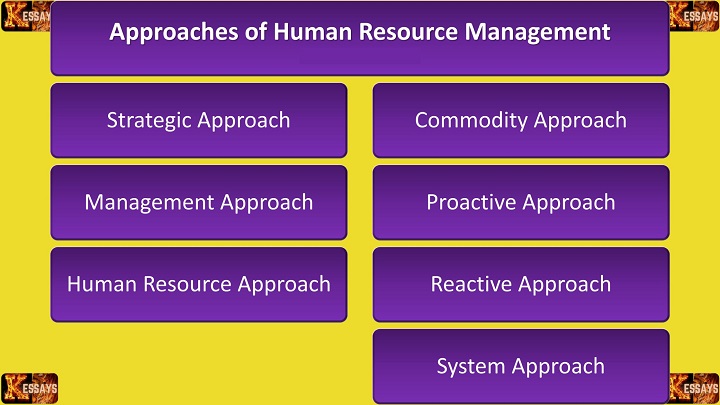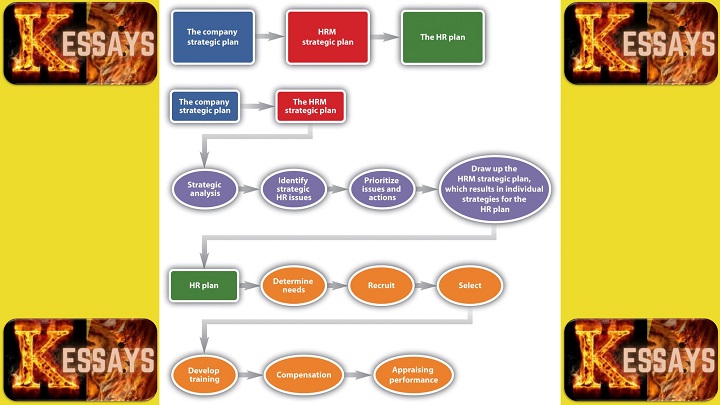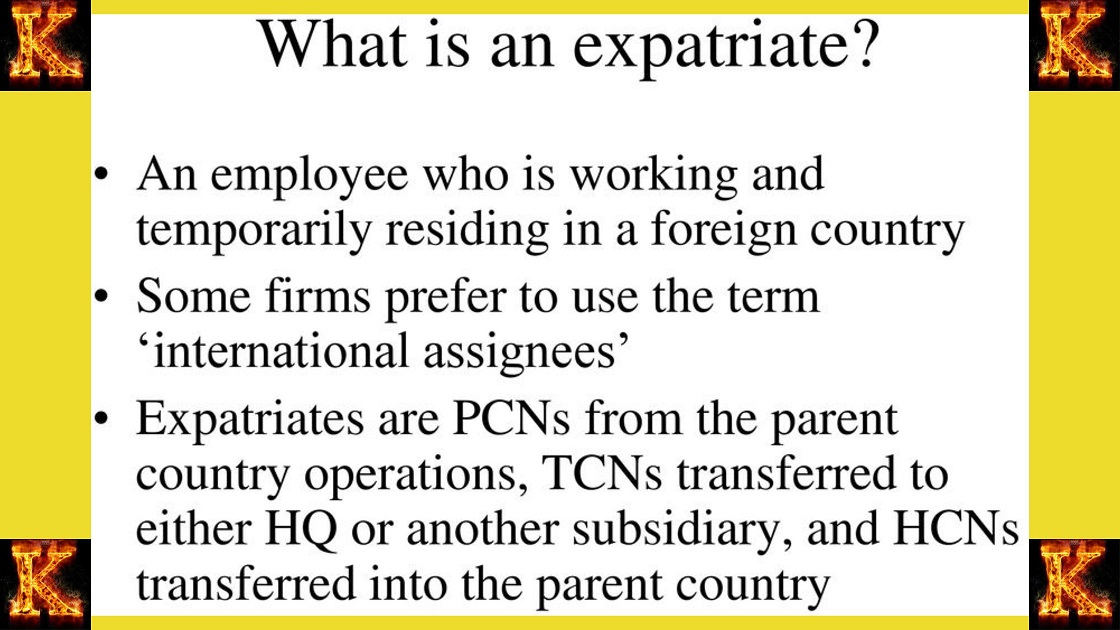In today's globalised business landscape, managing expatriate employees in human resource management (HRM) has become increasingly crucial for organisations operating across borders. Expatriate management in HRM entails strategically handling employees outside their home country, addressing various challenges related to cultural adaptation, legal compliance, and performance management. This guide explores the intricacies of managing expatriate employees in HRM, providing insights into critical questions and best practices.



Expatriate Management in HRM:
Expatriate management in HRM is a comprehensive process encompassing various strategic initiatives to manage employees working in foreign countries or cultures effectively. It involves systematically handling expatriate employees throughout the entire lifecycle of their international assignments. This process begins with the recruitment phase, where HR professionals identify suitable candidates with the requisite skills, experience, and cultural adaptability for overseas roles.
-
Recruitment:
- Identifying suitable candidates with the necessary skills and cultural adaptability for international assignments.
- Conducting rigorous selection processes to ensure candidates meet the requirements for overseas roles.
- Utilizing assessment tools and interviews to gauge candidates' readiness for cross-cultural challenges.
-
Deployment:
- Coordinating logistical arrangements such as visa processing, travel, and accommodation for expatriate employees.
- Providing pre-departure training and orientation programs to prepare expatriates for life and work in foreign environments.
- Offering support with immigration procedures, including obtaining work permits and residence visas.
-
Support:
- Acting as a primary point of contact for expatriate employees, offering ongoing assistance, guidance, and resources.
- Providing access to medical care, mental health support, and language training to help expatriates adapt to new environments.
- Facilitating cultural integration programs and networking opportunities to foster a sense of belonging among expatriate employees.
-
Retention:
- Implementing strategies to retain expatriate talent and ensure their continued engagement and commitment to the organization.
- Offering career development opportunities and pathways for advancement for expatriate employees.
- Planning for repatriation and reintegration to ensure a smooth transition to their home country or a new assignment.
-
Evaluation and Feedback:
- Establishing mechanisms for monitoring expatriate performance, including regular performance reviews and feedback sessions.
- Soliciting feedback from expatriate employees to identify areas for improvement and address any challenges they may face.
- Adjusting strategies and support mechanisms based on feedback and lessons learned from previous expatriate assignments.
Read Also: Strategic Capsim Business Simulation Help
How HR Managers Help Expatriate Employees:
HR managers play a pivotal role in assisting expatriate employees to navigate the challenges they encounter while working abroad. They provide comprehensive support throughout the expatriate lifecycle, including pre-departure training, cultural orientation, logistical assistance, and ongoing support during the assignment. By offering tailored resources and facilitating communication channels, HR managers help expatriate employees adapt to new environments and perform effectively.-
Pre-departure Training:
- HR managers organize and conduct pre-departure training programs to equip expatriate employees with the necessary skills and knowledge to thrive in their new environment.
- These training sessions cover various aspects such as cross-cultural communication, local customs and traditions, legal requirements, and practical tips for living and working abroad.
-
Cultural Orientation:
- HR managers provide cultural orientation sessions to help expatriate employees understand and appreciate the cultural nuances of their host country.
- These sessions aim to minimize culture shock and enhance expatriates' ability to integrate seamlessly into the local community and workplace.
-
Logistical Assistance:
- HR managers assist expatriate employees with logistical arrangements, including visa processing, housing accommodations, transportation, and family relocation.
- They serve as a point of contact for expatriates, offering guidance and support to navigate the host country's bureaucratic processes and administrative requirements.
-
Ongoing Support:
- Throughout the assignment, HR managers continuously support expatriate employees, addressing any challenges or concerns they may encounter.
- They serve as a liaison between expatriates and other departments within the organization, advocating for their needs and facilitating solutions to any issues.
-
Tailored Resources:
- HR managers provide expatriate employees access to tailored resources and services to support their well-being and success during the assignment.
- This may include language training, cultural integration programs, medical and mental health support services, and assistance with family adjustment.
-
Facilitating Communication Channels:
- HR managers facilitate open and effective communication channels between expatriate employees and relevant organizational stakeholders.
- They encourage regular check-ins and feedback sessions to ensure expatriates feel supported and valued throughout their assignments.
Read Also: Present Value of Terminal Value
Role of HR and Processes in Successful Expatriate Assignments:
HR plays a multifaceted role in ensuring the success of expatriate assignments. This includes strategic planning, candidate selection, compensation and benefits management, immigration assistance, cultural training, and performance evaluation. By implementing robust processes and policies, HR facilitates smooth transitions for expatriate employees and mitigates potential challenges that may arise during their assignments. Here's a detailed exploration of HR's involvement in expatriate assignments:-
Strategic Planning:
- HR engages in strategic planning to identify organizational needs and objectives for international assignments.
- This involves aligning expatriate assignments with business goals and determining the number, duration, and location of assignments based on strategic priorities.
-
Candidate Selection:
- HR is responsible for identifying and selecting suitable candidates for expatriate roles.
- This process involves assessing candidates' skills, experience, cultural adaptability, and willingness to relocate.
- HR may utilize assessment tools, interviews, and cross-cultural evaluations to identify the most qualified candidates for international assignments.
-
Compensation and Benefits Management:
- HR manages compensation and benefits packages for expatriate employees, ensuring they are competitive and equitable across different locations.
- This includes considering cost of living, tax implications, currency fluctuations, and hardship allowances.
- HR may also provide additional benefits such as housing allowances, relocation assistance, and education allowances for expatriate employees and their families.
-
Immigration Assistance:
- HR assists expatriate employees with immigration procedures and legal requirements for working abroad.
- This includes obtaining work permits, visas, residency permits, and other necessary documentation for expatriate assignments.
- HR ensures compliance with immigration laws and regulations in home and host countries.
-
Cultural Training:
- HR provides cultural training and orientation programs to prepare expatriate employees for life and work in foreign environments.
- This includes education on local customs, traditions, business practices, and social norms.
- Cultural training helps expatriates adapt to new cultural contexts and minimize culture shock during their assignments.
-
Performance Evaluation:
- HR establishes performance evaluation mechanisms to assess expatriate employees' performance and effectiveness.
- This may include regular performance reviews, feedback sessions, and goal-setting meetings to ensure expatriates meet organizational expectations.
- HR provides support and guidance to address any performance issues or challenges expatriate employees may encounter during their assignments.

Five Categories of Success for Expatriate Managers:
Expatriate managers can succeed across five key categories: cultural adaptation, job performance, personal well-being, family adjustment, and organizational support. Successful expatriate managers demonstrate cultural sensitivity, excel in their job roles, maintain a healthy work-life balance, ensure the well-being of their families, and receive adequate support from their organizations.-
Cultural Adaptation:
- Successful expatriate managers demonstrate cultural sensitivity and adaptability to thrive in diverse environments.
- They respect and embrace local customs, traditions, and business practices, fostering positive relationships with colleagues, clients, and stakeholders from different cultural backgrounds.
- These managers effectively navigate cultural nuances and communicate cross-culturally to build trust and rapport, enhancing collaboration and teamwork.
-
Job Performance:
- Expatriate managers excel in their job roles by leveraging their skills, expertise, and leadership capabilities to achieve organizational objectives.
- They demonstrate high competence, professionalism, and innovation levels, driving performance and delivering results in challenging international settings.
- These managers effectively manage teams, projects, and resources, adapting their management style to meet the needs of diverse stakeholders and achieve strategic goals.
-
Personal Well-being:
- Successful expatriate managers prioritize their well-being to maintain physical, mental, and emotional health during international assignments.
- They proactively manage stress, work-life balance, and burnout by practicing self-care, seeking support when needed, and engaging in activities that promote well-being.
- These managers cultivate resilience, adaptability, and a positive mindset to overcome challenges and thrive in dynamic and unfamiliar environments.
-
Family Adjustment:
- Expatriate managers ensure the well-being and adjustment of their families to the new cultural and social context.
- They provide emotional support, practical assistance, and cultural orientation to help their families acclimate to life abroad.
- These managers prioritize family needs, maintain open communication, and foster a sense of belonging and connection within the expatriate community, enhancing family satisfaction and overall expatriate experience.
-
Organizational Support:
- Successful expatriate managers receive adequate support from their organizations to facilitate their success in international assignments.
- They have access to resources, training, and development opportunities tailored to their needs and the assignment's demands.
- These managers receive ongoing feedback, coaching, and mentoring from organizational leaders and HR professionals to address challenges, enhance performance, and maximize their contribution to the organization's global objectives.
Read Also: Best Economics Essay Writing Service
Four Types of Expatriates:
Expatriates can be classified into four main types based on their roles and responsibilities: technical experts, functional managers, country managers, and global executives. Every kind of expatriate requires specific skills, competencies, and support mechanisms to thrive in international assignments.-
Technical Experts:
- Technical experts are individuals with specialized skills, knowledge, or expertise in a particular field or industry.
- These expatriates are often deployed to transfer technical know-how, implement specific projects, or provide technical support in foreign locations.
- Examples include engineers, IT specialists, researchers, and scientists tasked with sharing their expertise and driving innovation across global operations.
- Technical experts require in-depth technical proficiency, problem-solving abilities, and cross-cultural communication skills to fulfill their roles in international settings effectively.
-
Functional Managers:
- Functional managers oversee specific functional areas or departments within an organization's global operations.
- These expatriates may lead teams in finance, marketing, human resources, operations, or supply chain management.
- Functional managers ensure the efficient and effective execution of departmental objectives, policies, and procedures in alignment with corporate strategies.
- Examples include finance managers overseeing international financial operations, marketing managers launching products in new markets, and HR managers implementing global talent management initiatives.
- Functional managers require strong leadership, strategic thinking, and cross-functional collaboration skills to navigate complex organizational dynamics and drive performance across geographically dispersed teams.
-
Country Managers:
- Country managers oversee all aspects of a company's operations within a specific country or region.
- These expatriates serve as the primary point of contact for local stakeholders, including employees, customers, suppliers, regulatory authorities, and community members.
- Country managers develop and execute business strategies, manage local operations, drive revenue growth, and ensure local laws and regulations compliance.
- Examples include general managers, regional directors, and country heads leading subsidiary operations in foreign markets.
- Country managers require strong cross-cultural leadership, business acumen, relationship-building skills, and a deep understanding of local market dynamics to achieve business objectives and sustain competitive advantage.
-
Global Executives:
- Global executives are senior leaders responsible for driving overall corporate strategy, vision, and performance on a global scale.
- These expatriates occupy top leadership positions such as CEOs, presidents, vice presidents, or executive management team members.
- Global executives provide strategic direction, set organizational goals, allocate resources, and oversee the execution of critical initiatives across multiple countries and regions.
- Examples include CEOs steering multinational corporations, global presidents orchestrating worldwide expansion efforts, and chief officers leading cross-functional international teams.
- Global executives require visionary leadership, strategic foresight, global mindset, and practical stakeholder management skills to lead complex international organizations and navigate diverse cultural, political, and economic environments.


Comments are closed!